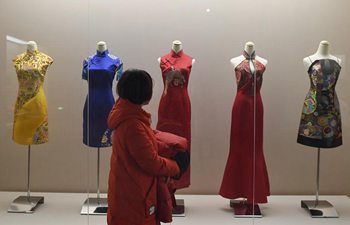by Peter Mertz
DENVER, the United States, Dec. 24 (Xinhua) -- Some of Hollywood's most famous celebrities face hefty fines from the Federal Trade Commission (FTC) because they are showing off products and not disclosing their affiliations with the paying sponsors.
WARNING SHOTS
FTC officials told Xinhua Friday that they weren't about to make international headlines by charging big name Hollywood celebrities with any influence peddling yet - that the federal agency was just sending out warning shots.
"People need information before they do the right thing," a top level FTC spokesman who perferred to remain anonymous said Friday. "If there are no signs saying the speed limit is 50 miles per hour, then we need to let them know," he said.
Instagram, Facebook, and Twitter are the most recent, widely-used social media platforms used by celebrity "social media influencers" to persuade buyers to buy certain products, the FTC said.
"It has been explosive - these social media venues reach enormous audiences and have drawn the interest of corporate America," said Seattle attorney David Richardson.
2017 is the fist time the FTC has targeted individual "social media influencers," although the federal agency recently nailed some of the world's biggest corporations, including Sony and Warner Bros.
"I think it's a good thing," Richardson said Friday, of the FTC now targeting celebrity social media influencers.
"At the end of the day they're protecting the consumer, and God knows the American consumer needs protection."
Actresses Shay Mitchell and Lucy Hale, and supermodel Naomi Campbell, made the list of 21 social media influences who got letters last week from the FTC reminding them of the law.
But a fine - up to 16-thousand U.S. dollars - could take months or years to be court ordered, insiders told Xinhua.
"The potential for fines is only if someone violates a commission order, and they cannot get penalties on the first violation," a FTC spokesman told Xinhua Friday.
Supermodel Campbell came out last week and flatly denied she had ties with Globe-Trotter, a luxury luggage brand mentioned in an Instagram post after the FTC letter. But the FTC's high-powered lawyers may be asking celebrity influence peddlers lots of questions in the next few months.
SIMILAR CASES
The law is simple. If you're being paid by a company to endorse its products, then the public has a right to know. And with the power and far-reaching tentacles of the modern social media, millions of potential buyers can be reached with one, simple Instagram pic.
The FTC is not afraid to wage legal war to have disclosure laws upheld - successfully taking on Time Warner, Sony, and Lord & Taylor in the last few years.
In 2014, Sony settled with the FTC on charges that it had deceived consumers with false advertising claims about the "game changing" technological features of its PlayStation Vita that it unveiled in 2011.
Sony was ordered to give purchasers of the game refunds of up to 50 U.S. dollars each.
The explosive video gaming industry took in about 9.5 billion U.S. dollars in 2007, 11.7 billion in 2008, and 25.1 billion in 2010, according to the Entertainment Software Association. And, according to Statista, video game revenues hit 51 billion U.S. dollars in 2011 and are projected to reach 90 billion by 2020.
"The gaming industry is so lucrative and big that the FTC has its hands full tying to monitor unsavory sales generation through a plethora of online advertising vehicles," Richardson told Xinhua Friday.
"The question remains if the influencers are disclosing their affiliations or not," Richardson said.
The FTC was created in 1914 to challenge "unfair methods of competition" after two Supreme Court decisions slammed the practices of corporate giants Standard Oil and American Tobacco in 1911.
Ben Taub, a Washington, DC IT expert has watched cases of questionable advertising practices help corporate sponsors boost sales to an inordinate degree.
"The Product Safety Commission (PSC) and Consumer Financial Protection Bureau are also involved with consumer protection, but they have been defanged and defunded by (President) Trump, so that may add extra burden to FTC regulators," Taub told Xinhua.
Taub noted that the PSC "gets involved with unsafe products, especially ones used by kids - car seats, Ikea dressers that fall over and kill you, etc., so they look at the products themselves - not the advertising, promotions and marketing."
Meanwhile, correcting deceptive marketing practices are exactly what the FTC does. And they do it well.
In late 2014, Warner Bros. Home Entertainment launched an online marketing campaign designed to generate buzz within the gaming community for the new release of Middle Earth: Shadow of Mordor,
Warner Bros. is America's biggest film studio with 2016 revenues of 13 billion U.S. dollars, according to the Hollywood Reporter.
It was released in September 2014 for the PlayStation 3 and in November 2014 for the Xbox 360, but the company failed to adequately disclose that it paid online influencers.
Warner paid the popular "PewDiePie" thousands of dollars to post positive gameplay videos on YouTube and social media - that were viewed by more than 5.5 million people.
"Consumers have the right to know if reviewers are providing their own opinions or paid sales pitches," said Jessica Rich, Director of the FTC's Bureau of Consumer Protection.
"Companies like Warner Brothers need to be straight with consumers in their online ad campaigns," she said.
Under the July, 2016 agreement, "Warner Bros. is barred from failing to make such disclosures in the future and cannot misrepresent that sponsored content, including gameplay videos, are the objective, independent opinions of video game enthusiasts or influencers."
LOAD & TAYLOR
In 2015, relating to the current Hollywood celebrities warnings, 50 models wearing a paisley Lord & Taylor dress were paid up to 4,000 U.S. dollars to post a picture of themselves wearing the dress on Instagram and other social media.
These influencers reached 11.4 million people on Instagram over two days, Lord & Taylor got 328,000 brand engagements, and the line of dresses sold out quickly.
On March, 2016, Lord & Taylor settled with the FTC that it "deceived consumers by paying for native advertisements, including a seemingly objective article in the online publication Nylon, and a Nylon Instagram post."
The retail clothing giant had not disclosed that the posts were paid promotions for the company's 2015 Design Lab clothing collection.

















